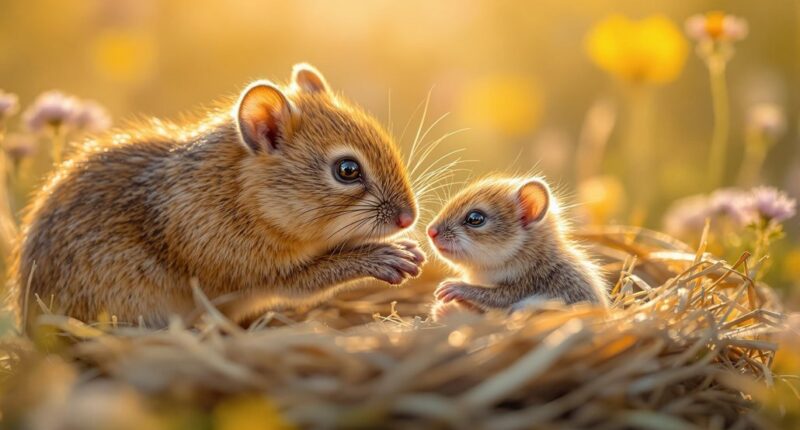Animal parenting strategies vary dramatically across species, offering insights into care behaviors. Prairie voles demonstrate shared parenting that positively affects offspring’s social development and aging. Meanwhile, reptiles provide minimal care compared to marsupials who nurture underdeveloped young in pouches. Research shows attentive parenting alters brain regions affecting emotions and social skills in various animals. Evolutionary factors like predation risks and mating systems influence which parent provides care. These natural patterns reveal surprising parallels to human caregiving approaches.
While humans often marvel at the complexities of raising children, the animal kingdom displays an equally captivating array of parenting strategies across different species. From reptiles that barely interact with their offspring to mammals that invest years in childcare, these diverse approaches reveal important insights about survival and development.
Animals use several core methods to care for their young. Many species deliver food directly to offspring or provide milk. Some parents carefully regulate egg temperature through incubation. Others actively defend against predators by sounding alarms or confronting threats. Many construct nests or dens to protect vulnerable babies from harsh weather and dangerous predators.
Parenting in the animal kingdom encompasses feeding, protecting, and sheltering young through a remarkable diversity of survival strategies.
Prairie voles offer scientists a remarkable window into parental care systems. Unlike most mammals where mothers do the bulk of childcare, voles share parenting duties between both parents. When vole fathers lick and groom their pups, the babies develop better social skills. This nurturing also changes the structure of the pups’ brains, especially in areas that regulate rewards and emotions. Notably, voles that receive good parenting show signs of slower biological aging. University of Virginia researchers discovered that increased paternal involvement creates beneficial gene changes related to sociality in male offspring.
The contrast between marsupials and reptiles highlights how different animal groups approach parenting. Most reptiles simply lay eggs and leave, offering minimal care beyond finding a safe spot for their eggs. Marsupials like kangaroos take a different approach, carrying underdeveloped babies in pouches where they continue to grow. Warm-blooded animals generally invest more in parenting than cold-blooded ones, partly because maintaining body temperature creates additional challenges for young animals.
Scientists have discovered that parental care literally shapes developing brains. Young animals that receive attentive parenting show changes in brain regions controlling emotions and social behavior. They typically grow up with lower anxiety levels and better ability to form relationships. The physical touch between parents and offspring triggers chemical changes that affect which genes get turned on or off during development.
Evolution has driven these diverse parenting strategies. When predators pose a major threat, cooperative parenting often evolves as a defense strategy. In contrast, when males can mate with multiple partners, they’re less likely to invest in childcare. In fish species, there is a surprising male-dominated care pattern where paternal-only care occurs nine times more frequently than maternal-only care. The certainty of genetic parenthood also influences care – animals in monogamous relationships typically share parenting more equally.
The consequences of parental care extend throughout an animal’s lifetime. Young animals that don’t receive proper care often grow up with abnormal stress responses and difficulty forming social bonds. They may age faster biologically and show reduced abilities to learn social rules. For each species, the right amount of parental investment helps guarantee offspring survive the vulnerable early stages of life and develop into successful adults.
Conclusion
The study of animal parenting continues to surprise scientists. From emperor penguins braving Antarctic winters to elephant matriarchs teaching survival skills, these behaviors reveal that care transcends species. What’s clear is that nature’s parenting strategies aren’t random but carefully evolved solutions. As researchers observe more species, they’re discovering that the drive to protect and nurture offspring connects humans with the animal kingdom in profound ways.








